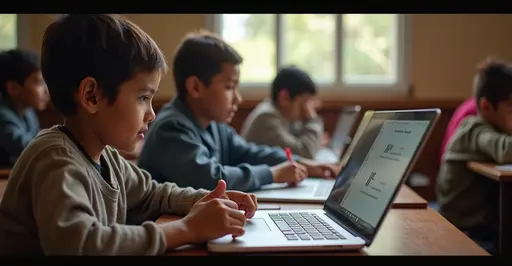American students remain nearly half a grade level behind in math and reading despite pandemic recovery efforts. Federal funding helped but digital access gaps and assessment challenges persist, with successful programs showing promise through targeted interventions.

Education Recovery Efforts Face Uphill Battle
New research from Harvard, Stanford, and Dartmouth reveals that American students remain nearly half a grade level behind in both math and reading despite the end of pandemic restrictions. The Education Recovery Scorecard analysis shows students are now further behind in reading than in 2022, with widening achievement gaps between high- and low-poverty districts.
Federal Funding Impact and Limitations
While federal relief funds totaling $190 billion helped prevent worse outcomes, particularly boosting scores in high-poverty districts by about 10% of a grade level, the most effective interventions were targeted academic catch-up programs like tutoring and summer learning. 'The federal investment was crucial, but we're seeing that one-time funding isn't enough to solve systemic educational challenges,' says education researcher Dr. Maria Rodriguez from Stanford University.
Digital Access Remains Critical Barrier
The pandemic exposed significant digital inequities that continue to impact recovery efforts. According to the Northstar Digital Literacy program, over 10.72 million assessments have been taken across 3,150 locations, highlighting the ongoing need for digital skills training. 'We're seeing that students without reliable internet access or digital literacy skills are falling further behind, even as schools return to normal operations,' notes digital education specialist James Wilson.
Assessment Standards Evolving
The National Standards for Quality Online Teaching 2025 provide updated guidelines for effective virtual instruction, but implementation varies widely across districts. New federal accessibility requirements from the Department of Justice will require public colleges and universities to meet WCAG 2.1 Level AA standards by April 2026, affecting online learning platforms and course content.
Successful Program Models
Some districts are showing promising results with innovative approaches. Manchester Public Schools' Flight School program emphasizes student-led, culturally relevant learning with a 1:4 educator-student ratio, achieving 98% attendance and 95% completion rates. Similarly, Oakland's HAcK '22 program combines academic project-based learning with social-emotional supports, resulting in 93% passing rates. 'What we're learning is that relationships and relevance matter more than ever in recovery efforts,' explains Manchester superintendent Dr. Sarah Chen.
Looking Forward
As pandemic relief funding sunsets, districts face difficult decisions about maintaining recovery programs. The challenge remains significant - UNESCO estimates that at the height of pandemic closures, nearly 1.6 billion students worldwide were affected, with closures lasting an average of 41 weeks. Experts warn that without sustained investment in proven interventions like high-dosage tutoring and summer learning programs, the educational impacts of the pandemic could persist for years to come.

 Nederlands
Nederlands
 English
English
 Deutsch
Deutsch
 Français
Français
 Español
Español
 Português
Português









